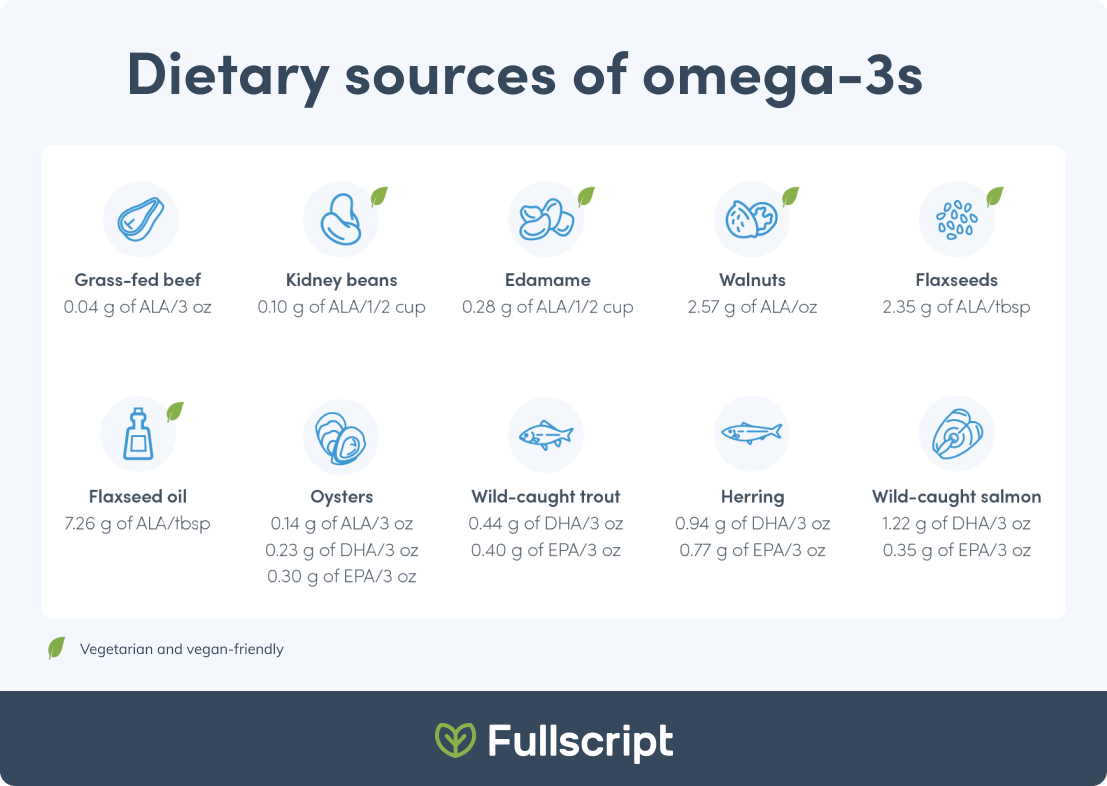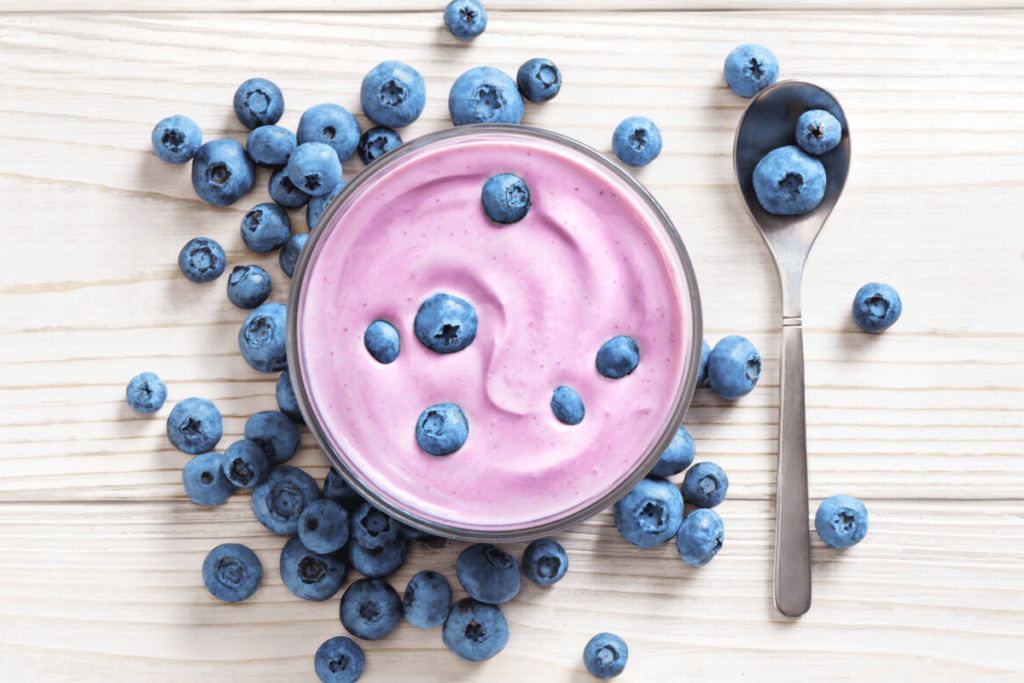The brain is our central control panel, playing a crucial role in just about every system in the body. So it’s no surprise that it needs a lot of fuel and specific nutrients to perform at its best. In fact, the brain accounts for 20% of the body’s energy use. (10)(17)
Considering that neurological disorders are the leading cause of disability and the second leading cause of death worldwide, supporting brain health is essential. (8)
The good news though is that understanding what foods are best for brain health can help you protect this precious organ. In this article, we’ll explore the research behind five of the best foods for brain health you can add to your diet.

Top 5 Best Foods for Brain Health
Because the brain plays such a vital role in almost every aspect of human bodily function and thus has high energy requirements, it is important to ensure the brain gets the nutrients required to function optimally.
1. Fatty fish
In recent years, research has confirmed that omega-3 fatty acids support brain health. Researchers have found that different omega-3s protect the brain and may be able to benefit a variety of different brain conditions, such as Alzheimer’s disease and other dementias, mood disorders, and Parkinson’s disease. (6)
Did you know? The human brain is 60% fat. (10)
The most abundant fatty acids in the brain are omega-3 fatty acids, particularly docosahexaenoic acid (DHA). (10) It is therefore no surprise that omega-3s are one of the most crucial molecules that influence your brain’s integrity and ability to perform. (4)
Unfortunately, the brain is not very efficient at synthesizing DHA, so it needs to be consumed through the diet or supplementation. (10) Luckily, certain fish are high in the omega-3 polyunsaturated fatty acids (PUFA): eicosapentaenoic acid (EPA), docosapentaenoic acid (DPA), and DHA. (2) Adding more fatty fish to your diet is a great way to increase your omega-3 intake. Of course, not all fish are created equal. For the biggest helping of omega-3s, try some of the foods outlined below.

2. Eggs
Eggs are making a name for themselves as possible brain food because of one key nutrient they contain: choline.
Choline is involved in a number of essential brain functions, including memory. Plus, it helps the brain create and release acetylcholine, a neurotransmitter or chemical messenger which is crucial to memory. (12) In fact, research shows that acetylcholine levels tend to be lower in people with Alzheimer’s disease. (7) In one large study, researchers found that eating more choline was associated with better memory and less likelihood of brain changes linked to Alzheimer’s disease. (15)
In another study, older adults with lower levels of choline in the blood had slower sensorimotor function and perception, as well as worse executive function and cognition. (14)
The good news is that it’s easy to get the recommended daily allowance of 550 mg per day for men and 425 mg per day for women since one large egg alone contains 147 mg of choline. (20)
3. Apples
While it’s too soon to say that an apple a day keeps dementia away, research indicates that this fruit aisle staple may provide crucial benefits for brain health.
One reason is that, like eggs, apples may increase the amount of acetylcholine in the brain. In one animal study, researchers found that apple juice concentrate increased acetylcholine levels and improved cognitive decline. (3)
Another reason apples are on the list of must-have brain foods is that they pack a hefty amount of quercetin—an antioxidant that multiple in vitro studies in both animals and humans have shown protects brain cells. (5) Much of the quercetin in apples is found in their skins, so be sure not to peel your apples before eating them. (1)
4. Chocolate
Chocolate lovers rejoice! Cacao, the key ingredient is chocolate, may make for a stronger brain. Maybe that explains why Nobel laureates are such fans of chocolate! (9)
In one study, researchers found that the flavonoids in cacao help with neuron and blood vessel formation in the parts of the brain that govern memory and learning. (13) Another study found that dark chocolate boosts brain plasticity, the brain’s ability to adapt, change, and form new connections which is key to brain health and behavior. (13)
When buying chocolate, be sure to pick a bar of chocolate with lots of cacao (i.e., 70% or higher) and less sugar for the best health benefits.

5. Yogurt
You’ve probably heard about the microbiome—the collection of millions of microorganisms that live in your body—and its importance in digestive health.
But did you know that the microbiome also plays a key role in brain health? Research has found associations between the microorganisms in the digestive tract and a number of brain-related illnesses, such as Parkinson’s disease, Alzheimer’s disease, schizophrenia, depression, and anxiety. (19) In fact, the brain and the microbiome are so closely linked that this connection has been named “the microbiota-gut-brain axis.” and what affects the gut can often affect the brain and vice versa. (21)
One of the best ways to keep your microbiome—and therefore your brain—healthy is to fuel the body with beneficial bacteria like those found in fermented foods such as yogurt. Researchers at UCLA found that consuming yogurt rich in probiotics may positively change the way your brain functions, however there is still more research required about how and why. (19)
When choosing yogurt, take the time to check the label and choose one that contains live and active cultures. The label should also tell you which specific bacteria strains are in the yogurt.
Since variety is key when it comes to the microbiome, you can increase your probiotic intake with other foods that provide different strains. Kefir, kombucha, sauerkraut, and kimchi are also sources of probiotics. (18)
The bottom line
The simple truth is that—as with all aspects of health—proper nutrition is essential for a healthy brain. Certain foods added to your diet, such as fatty fish, eggs, apples, chocolate, and yogurts, may help support memory, mood, and overall cognitive function.
- Boyer, J., & Liu, R. H. (2004). Apple phytochemicals and their health benefits. Nutrition Journal, 3(1).
- Calder, P. C. (2011). Fatty acids and inflammation: The cutting edge between food and pharma. European Journal of Pharmacology, 668, S50–S58.
- Chan, A., Graves, V., & Shea, T. B. (2006). Apple juice concentrate maintains acetylcholine levels following dietary compromise. Journal of Alzheimer’s Disease, 9(3), 287–291.
- Chang CY, Ke DS, Chen JY. Essential fatty acids and human brain. Acta Neurol Taiwan. 2009 Dec;18(4):231-41. PMID: 20329590.
- Costa, L. G., Garrick, J. M., Roquè, P. J., & Pellacani, C. (2016). Mechanisms of Neuroprotection by Quercetin: Counteracting Oxidative Stress and More. Oxidative Medicine and Cellular Longevity, 2016, 1–10.
- Dyall, S. C. (2015). Long-chain omega-3 fatty acids and the brain: a review of the independent and shared effects of EPA, DPA and DHA. Frontiers in Aging Neuroscience, 7.
- Francis, P. T. (2005). The Interplay of Neurotransmitters in Alzheimer’s Disease. CNS Spectrums, 10(S18), 6–9.
- GBD 2016 Neurology Collaborators (2019). Global, regional, and national burden of neurological disorders, 1990-2016: a systematic analysis for the Global Burden of Disease Study 2016. The Lancet. Neurology, 18(5), 459–480.
- Golomb, B. A. (2013). Chocolate habits of Nobel prizewinners. Nature, 499(7459), 409.
- Gómez-Pinilla, F. (2008). Brain foods: the effects of nutrients on brain function. Nature Reviews Neuroscience, 9(7), 568–578.
- Health Canada. Mercury in Fish – Canada.ca. Government of Canada. Retrieved November 5, 2021, from https://www.canada.ca/en/health-canada/services/food-nutrition/food-safety/chemical-contaminants/environmental-contaminants/mercury/mercury-fish.html
- National Center for Biotechnology Information (2021). PubChem Compound Summary for CID 187, Acetylcholine. Retrieved November 4, 2021 from https://pubchem.ncbi.nlm.nih.gov/compound/Acetylcholine.
- Nehlig, A. (2013). The neuroprotective effects of cocoa flavanol and its influence on cognitive performance. British Journal of Clinical Pharmacology, 75(3), 716–727.
- Nurk, E., Refsum, H., Bjelland, I., Drevon, C. A., Tell, G. S., Ueland, P. M., Vollset, S. E., Engedal, K., Nygaard, H. A., & Smith, D. A. (2012). Plasma free choline, betaine and cognitive performance: the Hordaland Health Study. British Journal of Nutrition, 109(3), 511–519.
- Poly, C., Massaro, J. M., Seshadri, S., Wolf, P. A., Cho, E., Krall, E., Jacques, P. F., & Au, R. (2011). The relation of dietary choline to cognitive performance and white-matter hyperintensity in the Framingham Offspring Cohort. The American Journal of Clinical Nutrition, 94(6), 1584–1591.
- Raichle, M. E., & Gusnard, D. A. (2002). Appraising the brain’s energy budget. Proceedings of the National Academy of Sciences, 99(16), 10237–10239.
- Rhee, S. H., Pothoulakis, C., & Mayer, E. A. (2009). Principles and clinical implications of the brain–gut–enteric microbiota axis. Nature Reviews Gastroenterology & Hepatology, 6(5), 306–314.
- Syngai, G. G., Gopi, R., Bharali, R., Dey, S., Lakshmanan, G. M. A., & Ahmed, G. (2015). Probiotics – the versatile functional food ingredients. Journal of Food Science and Technology, 53(2), 921–933.
- Tillisch, K., Labus, J., Kilpatrick, L., Jiang, Z., Stains, J., Ebrat, B., Guyonnet, D., Legrain–Raspaud, S., Trotin, B., Naliboff, B., & Mayer, E. A. (2013). Consumption of Fermented Milk Product With Probiotic Modulates Brain Activity. Gastroenterology, 144(7), 1394–1401.e4.
- U.S. Department of Health and Human Services. (n.d.). Office of Dietary Supplements – Choline. National Institutes of Health- Office of Dietary Supplements. Retrieved November 4, 2021, from https://ods.od.nih.gov/factsheets/Choline-HealthProfessional/
- Zhu, X., Han, Y., Du, J., Liu, R., Jin, K., & Yi, W. (2017). Microbiota-gut-brain axis and the central nervous system. Oncotarget, 8(32), 53829–53838.





